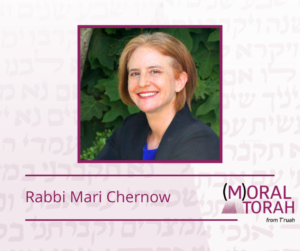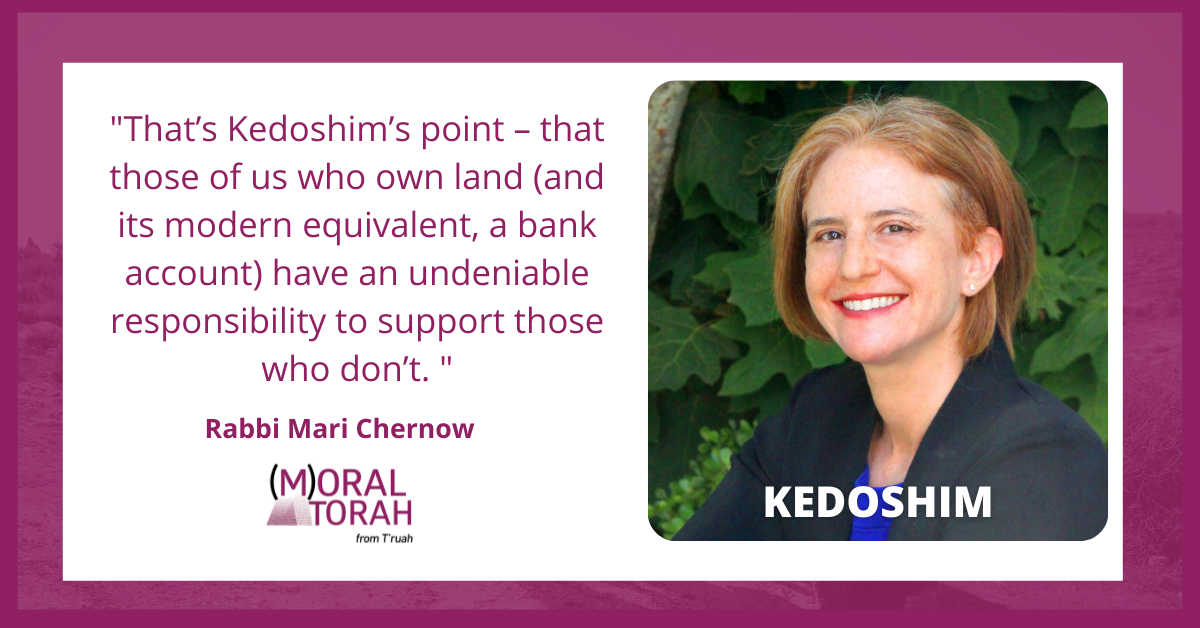A D’var Torah for Parshat Kedoshim by Rabbi Mari Chernow
There is a brief text that I study in the final session with all of my conversion students. Before they enter the mikvah and fully cast their lot with the Jewish people, I want them to read a discussion in the Talmud, tractate Yevamot, about what is required for conversion. As the rabbis of the Talmud debate the benchmarks for entering the community, they are, in effect, defining what is most essential in Judaism itself.
Surprisingly, this section (Yevamot 47a) gives a rabbi who is teaching a conversion student a great deal of discretion. The guiding rabbi must teach “some of the lenient mitzvot and some of the stringent mitzvot.” It is notable that the sages do not specify that the student must learn about Jewish holidays, the life cycle, history, philosophy, or even theology. Though it is surely presumed, they do not even say that the rabbi must mention, for example, Shabbat! The sages trust that the rabbi will pass along the most crucial traditions and texts.
They do, however, specify that every student must learn the meaning of four specific mitzvot. All four of them address poverty and hunger. Two of them come from a well-known verse in this week’s parshah, Kedoshim (Leviticus 19:9): “When you reap the harvest of your land, you shall not reap all the way to the edges of your field, or gather the gleanings of your harvest.”
Sign up to receive (M)oral Torah in your inbox each week.
If the rabbis see themselves as the gatekeepers of the Jewish tradition, they are making a striking statement in this text: To become a Jew is to understand the urgency of poverty and food insecurity. To join the Jewish people is to take personal responsibility for income inequality and its consequences.
The website of Mazon: A Jewish Response to Hunger tells stories of hunger in America. To cite just a few examples, we read there:
“Feeding my young grandson properly is the priority so I have to find things that I know fill me up.” (Judith in Arizona)
“If sickness comes along, it can drain all your money in one day. That’s what happened to me.” (Barbara in New York)
“My mom doesn’t know it, but I quit baseball so she wouldn’t have to spend money on my uniform.” (Dylan in Kentucky)
These stories highlight what we already know to be true – that financial hardship stems not from laziness or complacency; it is a societal problem with deep roots in social injustice. That’s Kedoshim’s point – that those of us who own land (and its modern equivalent, a bank account) have an undeniable responsibility to support those who don’t.
Find more commentaries on Kedoshim.
In a recent New York Times Opinion piece, Ezra Klein writes about Joe Biden’s 2021 expanded child tax credit (April 17, “America Has Turned Its Back on Its Poorest Families”):
A study out of Columbia found it cut child poverty by more than 25 percent, pulling 3.4 million children above the poverty line, despite the raging Covid pandemic. Data from the census shows that the number of parents who said that their children didn’t have enough to eat fell by more than three million.”
What was unusual about the tax credit, he argues, is:
“There were no strings attached. It was just money. It could be used for child care, for food, for clothes, for anything. It treated parents, even poor parents, as the experts on their family’s finances, a quietly radical idea in American social policy.
 Kedoshim has no litmus test for those who would share our crops. How refreshing! It assumes that all who come in search of food are worthy and deserving. It puts into daily practice what we all recited just weeks ago in the Haggadah, “Let all who are hungry, come and eat!” It teaches that society will become whole only when those of us with resources acknowledge that our abundance is not ours alone. When we agree that abundance is best used to restore balance.
Kedoshim has no litmus test for those who would share our crops. How refreshing! It assumes that all who come in search of food are worthy and deserving. It puts into daily practice what we all recited just weeks ago in the Haggadah, “Let all who are hungry, come and eat!” It teaches that society will become whole only when those of us with resources acknowledge that our abundance is not ours alone. When we agree that abundance is best used to restore balance.
Klein refers to the “moral horror, that a country as wealthy as ours leaves so many children in poverty.” Kedoshim seeks to rectify that reality. Yevamot tells us that doing so is the very essence of what it means to be a Jew.
Rabbi Mari Chernow is the Senior Rabbi of Temple Israel of Hollywood, in Los Angeles.


